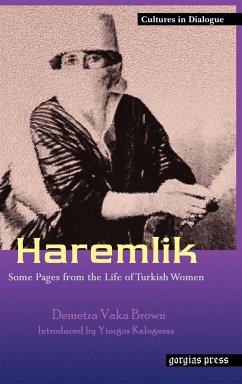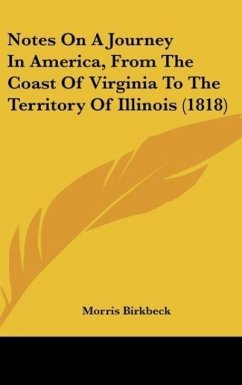
Haremlik. Some Pages from the Life of Turkish Women
Versandkostenfrei!
Versandfertig in 1-2 Wochen
88,99 €
inkl. MwSt.

PAYBACK Punkte
44 °P sammeln!
Born as a Greek Ottoman in Constantinople/Istanbul, Demetra Vaka Brown (1877-1946) moved to America where she became a journalist and novelist, revisiting Turkey to write several books about the twilight of the Ottoman Empire and the emergence of the Turkish Republic. Her first book, Haremlik: Some Pages from the Life of Oriental Women, published in 1909, was based on experiences from 1901 when modernization had made inroads into Ottoman domestic life and the harem was becoming a thing of the past. Her reflections on life in the harem suggest the conflicted nature of her allegiances. On the on...
Born as a Greek Ottoman in Constantinople/Istanbul, Demetra Vaka Brown (1877-1946) moved to America where she became a journalist and novelist, revisiting Turkey to write several books about the twilight of the Ottoman Empire and the emergence of the Turkish Republic. Her first book, Haremlik: Some Pages from the Life of Oriental Women, published in 1909, was based on experiences from 1901 when modernization had made inroads into Ottoman domestic life and the harem was becoming a thing of the past. Her reflections on life in the harem suggest the conflicted nature of her allegiances. On the one hand Haremlik is nostalgic for the Ottoman life that was rapidly disappearing, and on the other hand, its author enjoys the freedoms of a professional American woman. Tracing the emergence of a modern sensibility among Muslim women, Haremlik also reveals the predicament Vaka Brown faced in constructing an authorial and narrative identity in the interstices between East and West, modernity and tradition. Yiorgos Kalogeras is Professor of English in the School of Philosophy, Aristotle University, Thessaloniki, Greece. Cultures in Dialogue returns to print sources by women writers from the East and West. Series One considers the exchanges between Ottoman, British, and American women from the 1880s to the 1940s. Their varied responses to dilemmas such as nationalism, female emancipation, race relations and modernization in the context of the stereotypes characteristic of Western harem literature reframe the historical tensions between Eastern and Western cultures, offering a nuanced understanding of their current manifestations.














